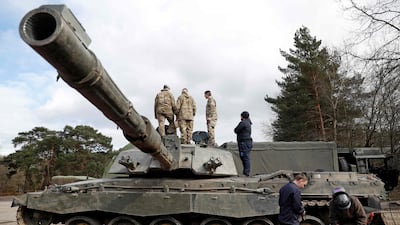The British Chancellor is taking a “big risk” by not boosting the UK’s defences while instead focusing on election-winning handouts, military commentators have said.
Jeremy Hunt gave away £10 billion by reducing the National Insurance charge, which covers health payments, during his budget speech on Wednesday in which he did not mention any new uplifts for defence.
The Treasury chief also handed out cash to landlords by reducing capital gains tax by four per cent to 24 per cent, and again froze duty on fuel.
It was the Conservatives' last budget before a general election later this year and the final opportunity to boost their dire poll position, currently 20 points behind the Labour opposition.
Throughout his hour-long budget delivery to MPs, Mr Hunt only used the word “defence” once, even though commentators believe it needs a significant boost to discourage Russian President Vladimir Putin from taking his war beyond Ukraine.
“The military lacks deterrence at a time when the threats have never been higher in Europe and around the world, so this is a big risk,” said retired Col Hamish de Bretton Gordon.
“The budget does not appear to be pricing in a war in Europe, which is a distinct possibility, while our deterrence is woefully insufficient, given the threats that we're facing.”
There was also the argument that the £10 billion National Insurance handout would be “completely irrelevant” if the “Russian hordes are steaming across Europe”.

Col de Bretton Gordon argued that the money would have been better spent adding another 0.5 per cent to the defence budget which would buy another “armoured brigade making a big statement of intent”.
Asked by The National why defence was not mentioned in the budget given the threats, Treasury sources pointed to the £11 billion increase in spending that the armed forces received in last spring's budget.
“The most important thing we are doing for defence is the ensure the UK has a strong economy which makes it much more secure,” a Treasury source said.
But Prof Jeremy Black, a foreign policy commentator, argued that the main issue was that Britain did not have sufficient money to fund all its defence requirements.
He also suggested that a victory by Donald Trump in the US presidential election in November would mean that the Ukraine war would be drawn to a close.
“It is entirely possible that the Trump administration would seek a settlement of current disputes with Russia, which would make the idea of fighting a unilateral war with that country rather foolish.”
Professor Malcolm Chalmers, the think tank RUSI's deputy director-general, said the UK faced real capability cuts as a result of its spending squeeze.

"One of the striking things in a comparative perspective is that the UK is just about the only major European country which is not increasing its defence budget in real terms, and one of the few European countries which is also not increasing its military assistance to Ukraine much in real terms,” he said.
“The government is going to have to make some unpleasant short-term decisions between different conventional equipment capabilities at a time when the Ukraine war is shining the spotlight on neglected capabilities in which our armed forces clearly need to invest more."
With the Office of Budget Responsibility (OBR) suggesting that Britain was now out of a brief recession, Mr Hunt had a bit more money to give away.
There were glimmers of electoral hope among Tories after it was disclosed that the OBR, the independent fiscal watchdog, predicted inflation would halve in months, dropping below 2 per cent.
Furthermore, the OBR raised its GDP growth forecast for this year to 0.8 per cent from 0.7 per cent and predicted the economy would grow by 1.9 per cent next year, rather that the predicted 1.4 per cent.
But the Chancellor also announced a one-year extension of a windfall levy on energy firms’ profits, because the “increase in energy prices caused by the Ukraine war is expected to last longer”. The levy will be extended to 2029, raising a further £1.5 billion.
Mr Hunt confirmed he will abolish the tax system for so-called “non-domiciles” in a bid to make a system that is “fairer and remains competitive”. The scheme would instead by replaced by a new residency-based system which would raise £2.7 billion a year.


